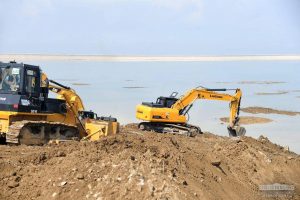Early on May 1, 2020, after a long and rainy week, a section of the earthen wall forming the Sardoba Reservoir in Uzbekistan gave way. The three-year-old dam, designed to hold 922 million cubic meters of water for irrigating the surrounding regions, burst and flooded more than 35,000 hectares of land in Uzbekistan and neighboring Kazakhstan. At least 70,000 people were forced out of their homes by the flooding.
In the face of the dramatic failure, the Uzbek government promised an investigation into the calamity and punishment for the responsible parties. I argued at the time that “how the Uzbek government handles the investigation of the dam collapse matters, not just in the interest of getting to the bottom of the issue but as proof of progress on thorny issues like transparency and anticorruption.”
So far, not so good.
A trial regarding the dam began in late December. In early January, RFE/RL reported that the trial of 17 people had resumed, the defendants including “energy officials, top officials of the state railways company, and leaders of construction companies that were involved in the construction of the dam.”
The trial is being held behind closed doors and consequently, the details are muddled.
Per Kun.uz reporting: “The customer SUE Sirdaryo Qurilishinvest, the designer LLC Uzgip, the main contractor of the UE Uztemiryulqurilishmontaj, contractors JV Rezaksoy Suv Qurilish, LLC Omad Dubl, LLC Sariosiyo Qurilish, LLC Trans Service Complex, JV Topalang Sherobod, as well as officials of the Ministry of Water Resources and Operations Directorate are among the accused.”
Topalang, which is among the contractors, was earlier reported to have been awarded its contract by the UzSuvEnergo association, which reported to the Uzbek Water Resources Ministry. Last May, RFE/RL reported that Abdulghani Sanginov, an Uzbek senator who was appointed to the commission investigating the collapse, may have commercial interests in the involved parties. Sanginov is chairman of the board of UzbekHydroEnergo, the joint stock company which the UzSuvEnergo association was reorganized into in 2017. He had also led UzSuvEnergo since 2008.
It is not surprising that relatives of some of the defendants told RFE/RL that those on trial are “scapegoats” and that more senior officials who are culpable are not going to face justice.
Meanwhile, the Uzbek government, alongside its promises to investigate the dam failure’s causes and punish the responsible parties, also pledged to aid those affected by the disaster.
More than 2,500 houses and 76 multi-story apartment blocks were destroyed by the flooding, according to official figures, plus more than 1,700 damaged homes and 52 damaged apartment blocks. Kun.uz reported in September that 1.5 trillion Uzbek soms ($142.7 million) had been allocated to the Sardoba region. Those displaced by the disaster were supposed to be given new accommodations and financial compensation. But as Agnieszka Pikulicka-Wilczewska reported for Al-Jazeera in September 2020, “Despite the scope of the tragedy… local officials have prevented journalists from investigating victims’ claims of mistreatment, and the causes of the disaster.”
Pikulicka-Wilczewska’s reporting last year highlighted complaints that despite promises many of those affected were not hopeful about receiving compensation – with residents claiming only those with connections or who paid bribes received money.
Those complaints have not gone away with time. RFE/RL reported recently that a 34-year-old Uzbek man who published a video statement in early January accusing local authorities of unfairly distributing newly constructed homes had been arrested and given a week sentence. Locals who spoke to RFE/RL in the area, as well as an Uzbek rights activist and blogger, said more had been arrested, under minor charges of hooliganism and disobeying the authorities after they, too, tried to raise complaints about the distribution of compensation and housing.
Last year, I worried that Uzbek officials would try to sweep the collapse under the rug with an investigation blaming the bad storms that precipitated the collapse and holding no one to account. That hasn’t occurred. The state admits via the ongoing court case that the dam’s failure was man-made, but the path taken isn’t all that much better: Holding closed-door trials is hardly a sign of a transparent justice system and reports of journalists being hassled for investigating the conditions in the region doesn’t speak well to the state of the Uzbek media.

































